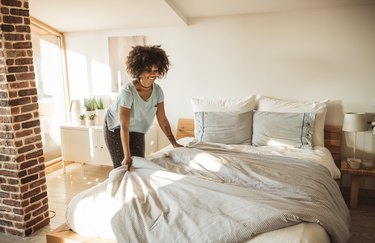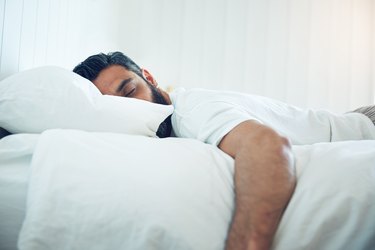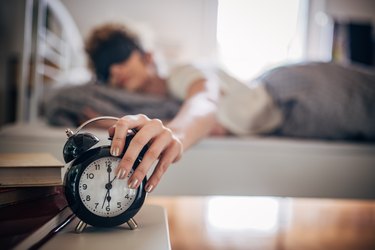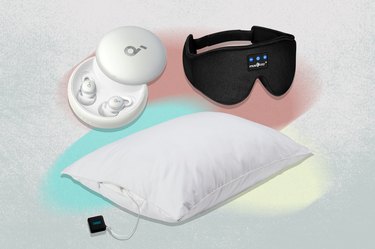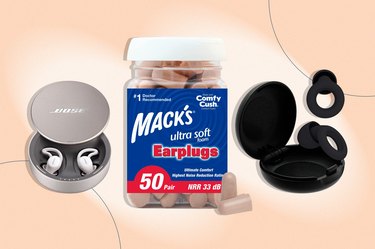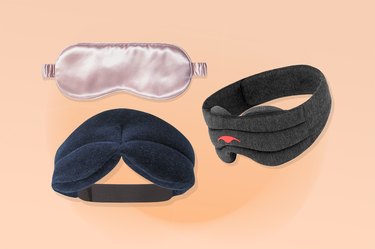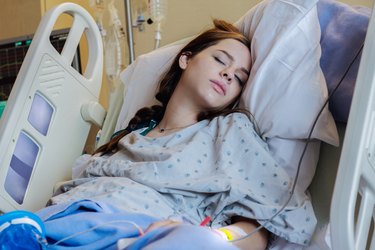
The hospital's not the destination for a good night's sleep: lights are bright, sheets are scratchy and noise levels are high.
Plus, if you're there, you're likely not feeling in tip-top shape, and you may have pain or other symptoms that can get in the way of good sleep.
Video of the Day
Video of the Day
But while you likely won't get the best rest of your life during an overnight hospital stay, all is not lost when it comes to catching decent zzzs.
Here, experts share how to sleep better while in the hospital — along with why it matters, anyway.
Why Getting Good Sleep Matters
"We know that there's a huge link between sleep and recovery in the hospital," academic hospitalist Vineet Arora, MD, MAPP, dean of medical education at the University of Chicago Pritzker School of Medicine, tells LIVESTRONG.com
After all, if you're in the hospital because you're ill, your body is under a lot of stress, says Thomas Kilkenny, DO, director of the Institute of Sleep Medicine at Staten Island University Hospital, Northwell Health. "Lack of sleep will just compound the problem," Dr. Kilkenny says.
Here are a few of the ways getting good quality sleep helps aid your recovery, according to Dr. Kilkenny:
- Decreased inflammation, so tissue can heal faster
- Improved sugar metabolism: Hyperglycemia (aka high levels of sugar) can get in the way of your recovery, Dr. Kilkenny says. Hyperglycemia is associated with hospital-acquired infections, per a February 2021 article in Diabetes Care.
- Reduced stress hormone levels and increased energy and alertness
- Eased depressive symptoms — depression can be common after surgery or when you're ill
- Support of your immune function — You're more prone to illness when your sleep is less than optimal, Dr. Kilkenny notes. "But also the actual immune system is slowed, so the production of antibodies are reduced."
All this is to say that sleep matters for your immune function, healing and also your mental wellbeing, says Alex Dimitriu, MD, who's double board-certified in psychiatry and sleep medicine and is the founder of Menlo Park Psychiatry & Sleep Medicine.
And sleep during hospital stays is particularly important for older adults, because a lack of it contributes to delirium, Dr. Dimitriu notes. This occurs when you don't get enough deep sleep, preventing your brain from clearing toxic metabolites, and leading to disorientation and being agitated, Dr. Dimitriu says. Delirium "prolongs hospital stays, results in falls and can take weeks to recover from," he says.
Why It’s So Tricky to Sleep in Hospitals
There are near-endless reasons why hospitals are hard on sleep. Here are just a few:
- It's not familiar: Sleeping while you travel can be hard due to the "first night effect" when you struggle to sleep due to unfamiliar surroundings, according to an April 2019 article in Psychiatry Research. In the hospital, that experience is compounded — not only are you on guard due to an unfamiliar bedroom (and potentially a roommate who is a stranger), but unlike a hotel, no real effort has been made to supply you with a comfortable mattress and pillows and soft-to-the-touch bedding. Take the mattress: It's designed for washing, Dr. Kilkenny notes, not for comfort. Plus, room temperatures may not suit your preferences.
- Noise: "Hospitals are noisy places full of beeping machines," Dr. Dimitriu says.
- Activity: At home, when it's time to go to bed, a restful atmosphere takes over. You get that "all through the house, not a creature was stirring" vibe. Not so in a hospital! "In a busy hospital, there is activity ongoing 24/7. There are people running about at all hours of the night. The night shift functions pretty much at the same intensity as the day shift," Dr. Kilkenny says.
- Interruptions: In a hospital, it's easy to get the sense people don't really care about your sleep. "Staff will often come to check vital signs, drips and other devices, as well as drawing blood for lab work at odd hours of the night or morning," Dr. Dimitriu says. Plus, you may have a roommate, which means double the interruptions, as staff enter to check your vitals, and then your roommate's.
- Lights: "It is never truly dark in a hospital," Dr. Kilkenny says — the lights are dimmed but not off in the hallways.
- You're in pain — or feeling distressed: You may feel pain or anxiety or stress when you're staying in the hospital, Dr. Kilkenny notes.
What You Can Do to Get Better Sleep
1. Check on Your Hospital’s Sleep Protocols
If you're in the hospital overnight, you might be woken up several times — phlebotomists typically collect blood from patients at 4 a.m. so labs are ready for physicians' morning rounds, Dr. Arora says. Nurses may stop by once or several times to check on your blood pressure and other vitals and deliver medications.
None of this is conducive to sleep, and frustratingly for anyone woken up several times, some of these actions may not even be necessary. For example, there's no evidence to support taking vitals from every hospitalized patient every four hours, Dr. Arora says. She's the co-author of a May 2020 article in the Journal of Hospital Medicine titled "Things We Do For No Reason™: Routine Overnight Vital Sign Checks," which posits a better strategy is forgoing overnight vitals with low-risk patients.
In a pilot study — which again involved Dr. Arora, who describes improving sleep in hospitals as "my forte" — researchers shared educational resources, a sleep kit (with earplugs and similar sleep-promoting items) and recommended three questions for patients to ask their care team:
- Can I get my blood drawn during waking hours?
- Do I need overnight vitals?
- If I have to be woken up during the night, can I get everything done all at once?
Patients who asked those questions "were significantly more likely to experience nights with fewer disruptions due to nighttime vitals," according to the 2021 pilot results published in BMC.
While you're not part of this pilot study, you too can ask these straightforward questions — and doing so may lead to far superior sleep! "Speak with your doctor and nursing staff to ask how much all nightly interruptions could be reduced within reason," Dr. Dimitriu recommends.
2. Stay on Your Sleep Schedule
"The same sleep hygiene steps that one should use at home should be replicated in the hospital; as best as possible," Dr. Kilkenny says.
That means avoiding big meals close to bed, and skipping alcohol and caffeinated beverages near bedtime too. If you usually dim the lights at 9 p.m., then read for another hour before turning the lights off completely and drifting off, see if you can do so in the hospital.
"Try to stay on your consistent sleep schedule and stick with your relaxing pre-bedtime routine even while in the hospital," Dr. Kilkenny says.
By the way, sticking to your usual sleep schedule means you'll want to wake up at your usual time, too.
3. Get Light During the Daytime
At night, you'll want darkness for better sleep (more on that in a moment). But during the day, you want bright, natural light, Dr. Dimitriu says. So, "open the blinds by day," he says.
Again, this may or may not be possible, depending on your hospital room setup.
4. Be Active During the Day (if Possible)
Being bed-bound by day leads to poor sleep, Dr. Dimitriu says. "You have to be 'vertical,' by day, to sleep better 'horizontally,' by night," he explains.
Getting out of bed may not be possible during your hospital stay. But aim to "move around as much as possible during the day," Dr. Dimitriu says.
Maybe that means changing the incline of your bed so you're more seated, or going for a walk down the hospital corridor. You can try doing exercises in your bed or chair, too, according to Memorial Sloan Kettering Cancer Center (MSKCC). Check in with your health care team about what's doable, and what's off-limits.
And, do your best to avoid napping. That can be tricky, because a long boring day stuck in bed can make a nap tempting. But ultimately, napping during the day can make it harder to fall asleep at nighttime. If you need to nap, do so earlier in the day.
5. Request Meds
You'll want to avoid over-the-counter sleeping pills (think: Benadryl), says Dr. Dimitriu. Also best avoided are many prescription sleeping aids such as zolpidem or alprazolam (aka, Xanax).
"Such medications are frowned upon in the hospital because of their propensity to cause confusion or unsteadiness, especially in the elderly," Dr. Kilkenny says.
But you're not without options: Typically, if you need a sleep aid in the hospital, you'll be given melatonin, Dr. Kilkenny says.
Pain can also get in the way of sleep. In fact, along with middle-of-the-night vital signs, it's one of the top causes for disrupting sleep, according to a February 2017 study in the Journal of Sleep Medicine, which surveyed both patients and nurses.
Dr. Arora was one of the researchers of this study. Along with issuing surveys, the researchers also had patients wear an actigraph device (which measures activity during sleep) to measure patients' sleep time, and found that "pain was associated with the greatest objective sleep loss."
6. Reduce Sounds and Light at Night
Obscure the brightness and noise of the hospital with sleep masks to cover your eyes and ear plugs, suggests Dr. Dimitriu. Or, use an app on your phone for white noise, or bring your white noise machine from home.
Once it gets dark outside, dim the lights in the room, Dr. Kilkenny suggests. And follow the same best practices as you would at home: "Avoid any bright lights even from computers or iPads especially for the hour or so before sleep," Dr. Kilkenny says.
If you can't go without your device in the pre-sleep hours, turn down the intensity of the light, he says.
7. Bring Items From Home — Maybe
You may want to consider bringing items from home, such as pillows or blankets, or a framed photo to make your hospital room more homey.
Other items you might want to bring from home to feel more comfortable and stick to your at-home routine are a bathrobe, slippers and headphones, according to MSKCC.
But check first!
"Many physicians would suggest not bringing these items to the hospital in an effort to avoid bringing home possible contaminants or infections that are common in busy hospitals," Dr. Kilkenny says.
8. Request Comfort-Boosting Items
While you may not be able to bring a pillow from home (your own pillow is the best pillow, obviously), you can ask for an extra one, Dr. Kilkenny says.
Other things you can request: an extra blanket, or moving to a room without a roommate if yours is disruptive.
- Diabetes Care: "Increased Hyperglycemia and Hospital-Acquired Infections Following Withdrawal of the RAPIDS Early Intervention Model of Diabetes Care in Medical and Surgical Inpatients "
- Psychiatry Research: "The first night effect during polysomnography, and patients’ estimates of sleep quality"
- Journal of Hospital Medicine: "Things We Do For No Reason™: Routine Overnight Vital Sign Checks"
- BMC: "Piloting I-SLEEP: a patient-centered education and empowerment intervention to improve patients’ in-hospital sleep"
- Memorial Sloan Kettering Cancer Center: "Improving Your Sleep During Your Hospital Stay"
- Journal of Sleep Medicine: "Awakenings? Patient and Hospital Staff Perceptions of Nighttime Disruptions and Their Effect on Patient Sleep"
Is this an emergency? If you are experiencing serious medical symptoms, please see the National Library of Medicine’s list of signs you need emergency medical attention or call 911.
